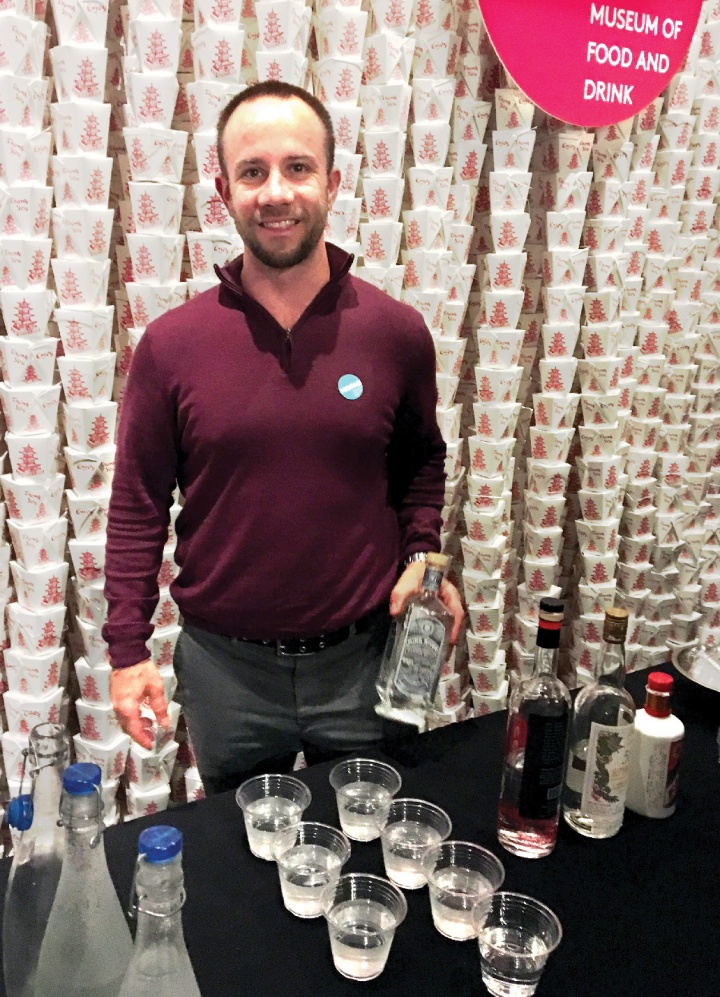Columbia College | Columbia University in the City of New York
Bill Isler ’03 Is Betting on Baijiu
On a warm April evening in Brooklyn’s trendy Williamsburg neighborhood, Bill Isler ’03 is slinging cocktails and greeting guests at the Museum of Food and Drink. Standing in front of a wall made of Chinese takeout containers, Isler makes sure each visitor gets a cocktail of rum, passionfruit liqueur, pineapple juice, lime juice and, as the featured ingredient, baijiu. The Chinese alcohol, which Isler affectionally describes as “inimitable,” is poised to make a move on Western audiences and Isler’s company, Ming River Baijiu, is at the forefront.
Baijiu, pronounced “bye-joe” and translated as “white spirit” in Mandarin, is a catch-all term for traditional Chinese grain spirits. Isler had his first taste of the complexly flavored libation — think nearly overripe fruit with a bit of an earthy burn — while studying abroad in China as a College student; “I thought it was the worst thing ever,” he says. However, the spirit grew on him and he later learned that his first experience wasn’t unique. Baiju is typically drunk neat at room temperature during traditional Chinese dinners; small, thimble-sized amounts are taken dozens of times throughout the meal. Those unfamiliar with the drink often end up overconsuming.
“A lot of Westerners end up really disliking baijiu because of the way it’s drunk more than because of its taste,” Isler says. “If they go to a dinner and have 30, 40 shots of it, they’ll feel terrible the next day and, because baijiu has a distinctive aroma and flavor, it stays with you a long time.”

Because baijiu is not usually used in cocktails or consumed on its own without food, there weren’t bars in China — or anywhere else in the world — dedicated to serving the spirit. Isler and three business partners decided to change that, launching the world’s first baijiu bar, Capital Spirits, in Beijing in 2014 (Isler had been working in China since graduation and had opened another bar in 2005). “We wanted to treat it like any other spirit in the West. We offer tasting flights, cocktails and education,” he says.
Capital Spirits quickly made a splash, winning Time Out Beijing’s “Best Specialist Spirits Bar” and “Best Newcomer Bar” awards. The bar then popped up on The New York Times’ “36 Hours in Beijing,” which recommended readers check out the “hutong speakeasy with antique wooden furniture and no sign on the door.” Forbes Travel ranked it as a top-three place for cocktails in Beijing, thanks to the unique opportunity for travelers to sample baijiu. “It was a tiny little hole in the wall, but somehow we managed to attract lots of attention,” Isler says.
News organizations weren’t the only ones taking notice of the new approach to an old spirit: Baijiu producers began to reach out. “We were approached by a lot of major distilleries,” Isler says. They eventually partnered with Luzhou Laojiao Distillery to start branding a Sichuan-style strong-aroma baijiu, fermented from whole-grain sorghum, to export to the West’s untapped market. “They were looking for someone like us, we were looking for someone like them — we had very similar ideas about how to bring baijiu to Western markets,” he adds. The team brought on baijiu expert Derek Sandhaus, and Ming River (comprising Isler, Sandhaus, Simon Dang BUS’10 and Matthias Heger) was born.
Isler and the Ming River team’s current aim is to teach new audiences what’s available outside the Western spirits market. According to the International Wines and Spirits Record, the volume of baijiu sold globally is more than two and a half times that of the second-best selling spirit — vodka — making baijiu the world’s most-sold spirit, but almost all of the sales are in China. “Ming River is a vehicle through which we’re able to educate people about strong-aroma baijiu and then baijiu in general ... we want to focus on education as much as possible,” says Isler.
Isler’s April event was a celebration of Ming River’s arrival: 10,000 bottles were scheduled to land shortly in New York, another 10,000 in California and a final 10,000 for European distribution. By World Baijiu Day on August 9 (“eight nine” in Mandarin sounds similar to “baijiu”), Isler and Ming River had partnered with a half-dozen NYC restaurants and bars to make exclusive baijiu cocktails to celebrate the day — part of their strategy to target mixology/craft cocktail bars, as those bartenders often look to surprise customers with new and unusual tastes. Says Isler, “It brings a flavor to the cocktail that’s unlike any other ingredient.”
Issue Contents
Published three times a year by Columbia College for alumni, students, faculty, parents and friends.
Columbia Alumni Center
622 W. 113th St., MC 4530, 6th Fl.
New York, NY 10025
212-851-7852
cct@columbia.edu
Columbia Alumni Center
622 W. 113th St., MC 4530, 4th Fl.
New York, NY 10025
212-851-7488
ccalumni@columbia.edu

